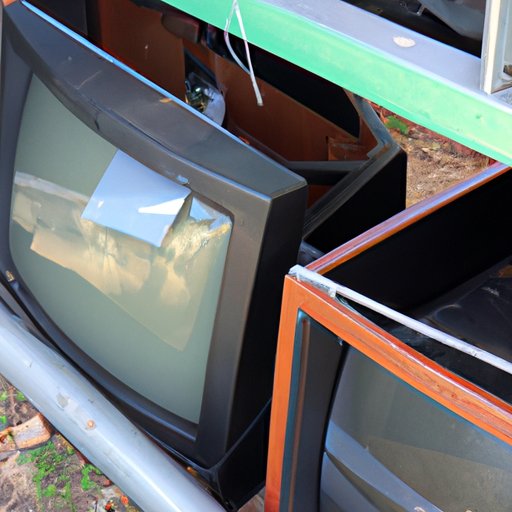
Introduction
Old televisions eventually break and need to be replaced. It can be challenging to know what to do with them. Proper disposal is crucial to prevent pollution and landfill buildup. This article provides an overview of the different methods of disposal and encourages creative repurposing as an environmental solution.
Recycling
Electronic waste (e-waste) recycling programs accept old televisions. These facilities break the electronic components down into recyclable parts and safely dispose of hazardous materials. The US government provides certifications for responsible recycling, such as the e-Stewards and R2 standards. These programs ensure that e-waste is not exported to countries without proper environmental regulations.
Not all recycling programs accept televisions for free. Some facilities charge a fee or only accept specific TV types. Research your area’s recycling options to choose the best option for your TV. The Environmental Protection Agency provides a searchable database of recycling facilities on their website.
Donating
Many donation centers accept electronics, including broken televisions. These organizations can repair the TVs and provide them to families in need or sell them to fund their programs. Charities such as Goodwill, the Salvation Army, and the American Council of the Blind accept electronics donations.
Donation centers have different requirements for donations, such as age and condition restrictions. They may also ask for proof of ownership or wipe the TV’s data before reselling or donating. Check with your preferred donation center for their specific requirements.
Trade-In
Several retailers offer trade-in programs for electronics, including old televisions. These programs provide a discount or store credit for traded-in electronics. Retailers such as Best Buy, Amazon, and Walmart offer trade-in programs, both in-store and online. Some programs involve partnering with an electronics recycling company for the hardware’s disposal.
Check with retailers in your area for specific details about their trade-in programs. Requirements vary, including age, brand, and condition of the television.
Trash Pickup
Regular trash disposal services accept electronic waste for curbside pickup. However, this option is not environmentally-friendly since the televisions end up in landfills. The devices’ components, including lead and mercury, can leak into the soil and groundwater, affecting local ecosystems and human health.
Before disposing of your TV with regular garbage, check your area’s guidelines and restrictions. Some states ban e-waste from landfills, requiring residents to use electronics recycling facilities.
Curbside Pickup
Some trash pickup services offer curbside pickup for electronic waste. These services may have large-item fees or specific business hours. Call your local service to determine their e-waste disposal options.
Don’t leave a broken TV out on the curb without contacting your local service. It can become a hazard to people and animals and potentially violate local laws. Some services provide free pickup of e-waste.
Repurposing
Finally, get creative! Old televisions can become new, functional household items. Several DIY tutorials online show how to repurpose old TVs into fishtanks, pet beds, and computer monitors. While not a direct disposal option, repurposing keeps the electronic hardware out of landfills and provides a fresh approach to recycling.
Conclusion
Choosing the proper method for disposing of a broken TV is essential to prevent environmental harm. Recycling, donating, or trading in electronics are environmentally-friendly solutions. If those options aren’t viable, use a responsible curbside pickup service. Repurposing is a fun and creative option for those willing to take on a DIY project. Whatever disposal option chosen, we must all take responsibility for e-waste’s impact on our communities, the environment, and human health.




